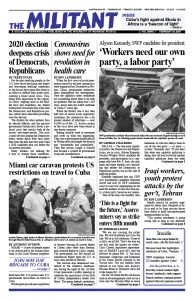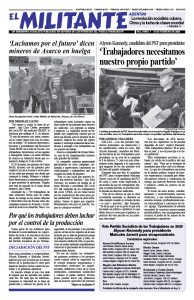LONDON — None of the capitalist parties contesting Ireland’s Feb. 8 parliamentary election came close to gaining a majority. Fianna Fail and Fine Gael, who have dominated Irish governments since a war for independence liberated a majority of the country from British rule in 1921, received a drubbing. Sinn Fein, which calls for a united Ireland, got its highest vote ever.
The elections gave a picture of real trends at work among working people.
Sinn Fein won 37 seats, one behind Fianna Fail and two ahead of Fine Gael, which had led the previous government. Horse-trading to put together a new government is now taking place.
Outgoing Fine Gael Prime Minister Leo Varadkar ruled out a deal between his party and Sinn Fein, while Micheal Martin, the leader of Fianna Fail, left open that possibility. Varadkar justified his stance pointing to Sinn Fein’s links to the now disbanded Irish Republican Army, which fought a military campaign against the British Army’s occupation of Northern Ireland prior to a cease-fire in 1998.
Compounding the problem to put together a governing coalition, six smaller parties and 19 candidates not aligned to any party won 50 seats, just short of a third of the 160-member Dail, the lower chamber of the Irish parliament.
The support registered for Sinn Fein showed it could have won more seats, but had only run 42 candidates. In addition to standing for Irish unity, it campaigned on a pledge to hike company taxes and raise government spending to address the lack of affordable housing, patch up the country’s crumbling health care system and increase the number of police.
The social crisis facing working people is reflected in press reports describing “cattle-market”-like conditions in hospital waiting areas, with hundreds of patients waiting for beds. As many as 550,000 people, in a country of 5 million, are on waiting lists for medical appointments. In addition, rents and house prices have skyrocketed and homelessness is rising. These conditions, in an economic upturn, fueled dissatisfaction with Varadkar’s minority government, which had depended on Fianna Fail for support.
The rout of Fianna Fail and Fine Gael at the polls is a response by working people to the role of both parties following the 2007 economic crash, years of high unemployment and the subsequent class-differentiated “recovery.” Fianna Fail’s popularity plunged when it held power earlier and imposed cuts in public sector workers wages, reduced the minimum wage, increased sales taxes, and cut pensions in 2010.
80% back a united Ireland
Sinn Fein’s manifesto contains a commitment to push London to hold a referendum on Irish unity in Northern Ireland in the next five years, alongside a similar referendum in the south.
“Four in five Irish people want a united Ireland,” reported a poll published in the London Times of Feb. 3. Former Fianna Fail Prime Minister Bertie Ahern told the Press Association that moves towards Irish unity were now inevitable.
This is accelerated by the increase in cross-border trade in the two decades since the 1998 cease-fire agreement was signed and the increasing integration of the economies, north and south of the border. During last year’s negotiations over the U.K. leaving the European Union, British Prime Minister Boris Johnson and Varadkar agreed to maintain a customs border through the Irish Sea rather than along the border between the Republic and Northern Ireland to facilitate trade across the island.
“In any event we’re heading towards a border poll, a referendum on unity,” Sinn Fein leader Mary Lou McDonald told the BBC Feb. 10. She said, “Certainly, the election result adds to this.”
Interviewed Feb. 10 by Irish state broadcaster RTE, McDonald said she was looking to put together a governing coalition. Danny McCoy, director general of Ibec, the employers lobby group, said company bosses would be able to work with a coalition that included Sinn Fein.
“We have seen them in action in the North. Their instincts are not so mad when it comes to business,” he told the Irish Times.
Sinn Fein resumed its power-sharing arrangement with the pro-British Democratic Unionist Party in the Northern Ireland Assembly last month.

